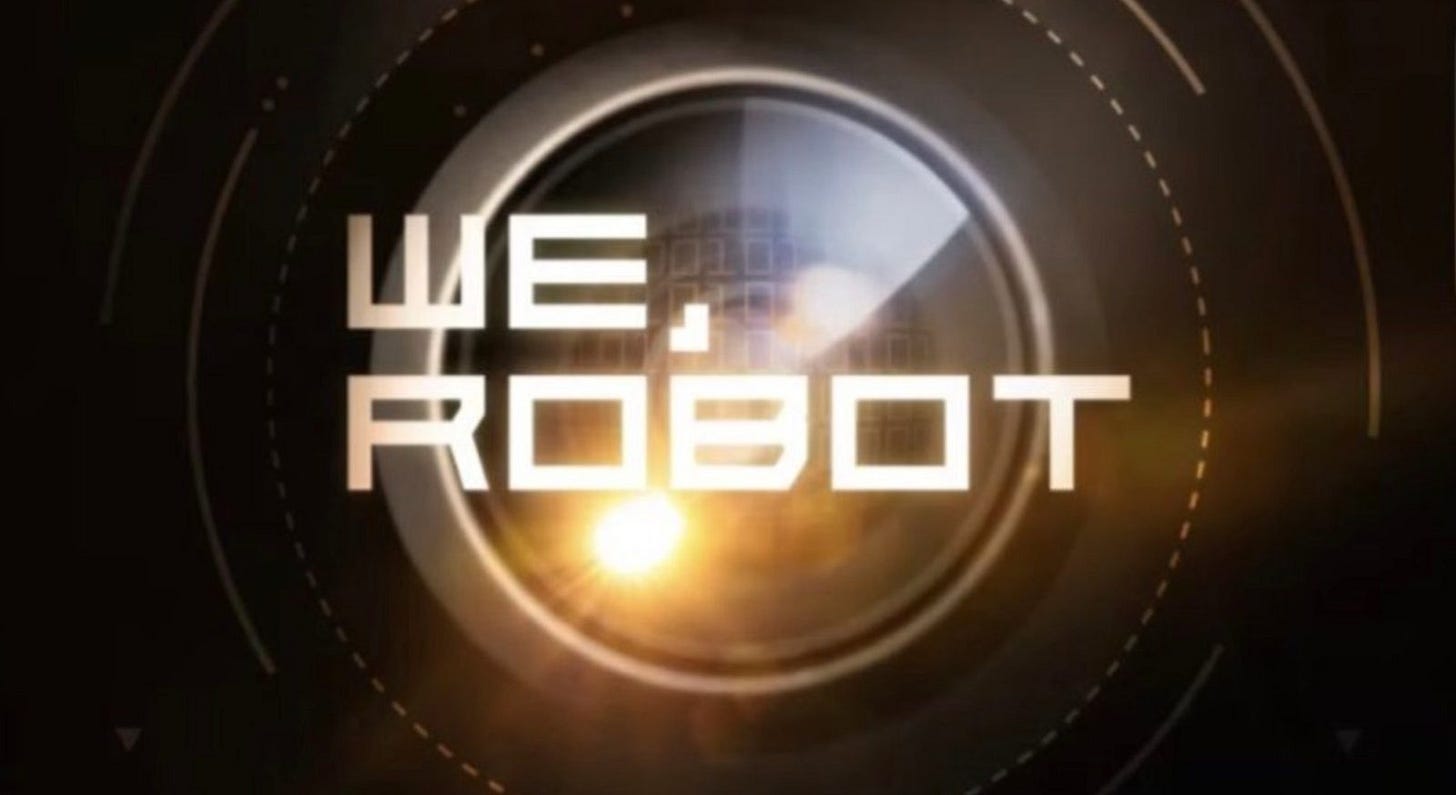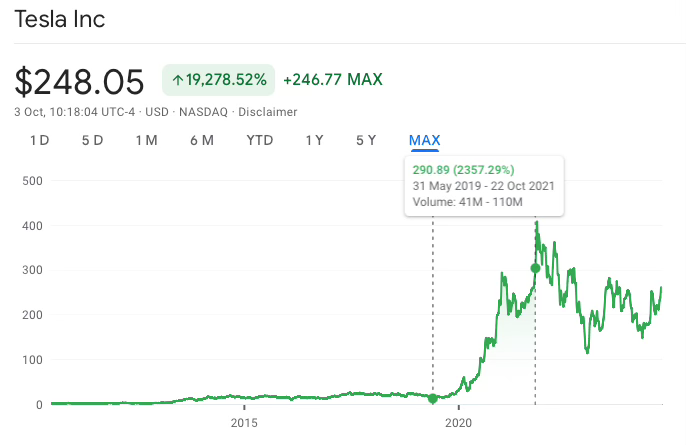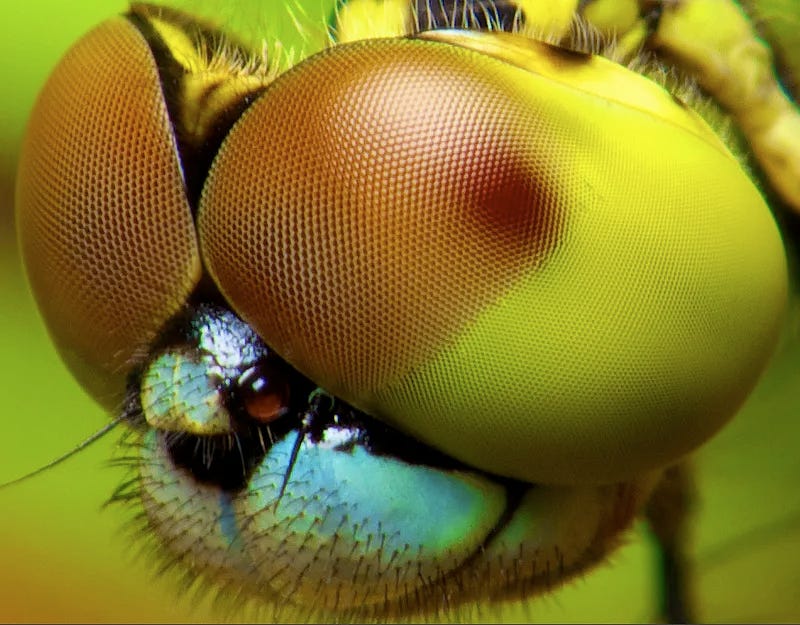TSLA Robotaxi 10.10: Is this finally it?
For a man who has a knack of overpromising and over-breaking them, is this finally the promise that would absolve all the broken promises?
Elon Musk is definitely one of a kind.
He sports the traits that every hyper growth investor would look for when free cash flow of a company is non-existent, yet with revenue doubling year on year.
Eccentric. Charting uncharted waters. Loud. Making the impossible possible.
I believe everyone has their own fair share of experience of friends, analysts, or even YouTubers giving “no-brainer buy calls” or boasting their TSLA 0.00%↑ gains 5 years back.
Commercialized electric vehicles as a dream, made into a reality. What’s next?
As you can see in the share price snapshot above, TSLA deserved to be revalued into the company it is today. Buying the company shares when everything was uncertain, when it was a carbon credit reseller company more than a EV maker seemed to have worked out fine in terms of total shareholder returns.
It might not be the first electric vehicle maker that pioneered to idea of having a car running on electricity, but it definitely is the company that convinced people switching to one.
It also inspired what I would call the EV Red Ocean. There are easily more than 100 EV companies around globally. And gaining market share is on every companies’ agenda.
Back then, it was easy to promise on becoming the world’s largest EV when competition is less than 10 players.
Now with so many existing players, piling onto autonomous driving is very similar to tech companies stockpiling on NVDA 0.00%↑ chips. The cost of missing out is on Autonomous Driving is big, similar to Big Tech scooping up Nvidia’s chips.
Musk is trying his best to reinvent/repurpose TSLA
TSLA should not be valued as a car company. It should be a robotics company.
FSD will bring TSLA to the next level.
I think the above narratives has been painted continuously by Elon Musk after his satirical remarks on competition seem to be firing on him.
And with TSLA no longer being the world’s largest EV company by deliveries, Musk has drawn eyeballs to other aspects and prospects of TSLA.
FSD and robotaxis are one of them. And with the Robotaxi event looming, it is hard not to be excited or even sceptical, depending on which camp you are on.
The YouTube video below summarises what could or could not happen. I don’t hold any position on TSLA, so whether robotaxis make or break TSLA, I am in no position to benefit nor lose regardless of how share prices react.
But I think investors, long or short camps, should take a deeper look and rationalise what are really the foundation building blocks of FSD or autonomous driving.
LiDAR vs vision: Taking a leaf out of science
The above video would provide you with a bit of understanding on the autonomous vehicle driving approach - either by LiDAR or cameras (vision).
Most companies use a combination of LiDAR and cameras due to the shortcoming of each approach used individually. Only TSLA remains stubborn in focusing fully on vision, with AI and tons of data to perfect it.
I am not an expert nor have a crystal ball to predict what would eventually happen, but to make a case on a reasonable prediction, I would like to take a leaf out of science, in this case Biology in particular.
In the animal kingdom, the carnivores that hunt for food have impeccable vision as it requires them to strike their prey at the right area. It does not however, guarantee the hunter a 100% success rate, meaning there will be days the hunter goes back home hungry.
An interesting fact that I stumbled across shows the hunting success rate of carnivores. While many land mammals require keen eyesight as a requirement to make kills, the overall Felidae family (cats, tigers, leopards) have a success rate of 10%-60%.
One mammal and insect on the list caught my eye - with a success rate of 90%.
From the vision camp, we have the dragonfly, sporting one of the best compound eyes in the Animalia kingdom, together with unique nimble and flying abilities.
From the ultrasound sonar camp (nature’s LiDAR) we have the harbour porpoise.
Imagine that if somehow evolution created the world’s greatest apex predator, with the best vision and ultrasound capabilities.
While I doubt we have something like that in the animal kingdom, at least from a autonomous self-driving car’s perspective, there are already a handful of companies applying this logic and rule.
My final thoughts on this short post
Again, I am not an expert. But my believes and rational is rooted to the laws and logic of science.
Not saying it wouldn’t be possible to have fully autonomous Tesla FSDs in the future, but I think it’s a bit conceited to boast that LiDAR wouldn’t work. And if you watch the YouTube video above, you would be aware the regulatory obstacles that are stacked unfavourably against TSLA.
Yes I know Elon has put a car into space and has done some pretty amazing stuffs. But he did not break any science, biology or physics rules and principles in the process of doing so.
To say that a cat or a tiger will be the ultimate predator due to its vision, while knowing orcas, dolphins and porpoises excel better due to their sonar capabilities - I just can’t accept that!
Unless you are telling me that Tesla cars can manoeuvre around as flexible as the dragonfly!






